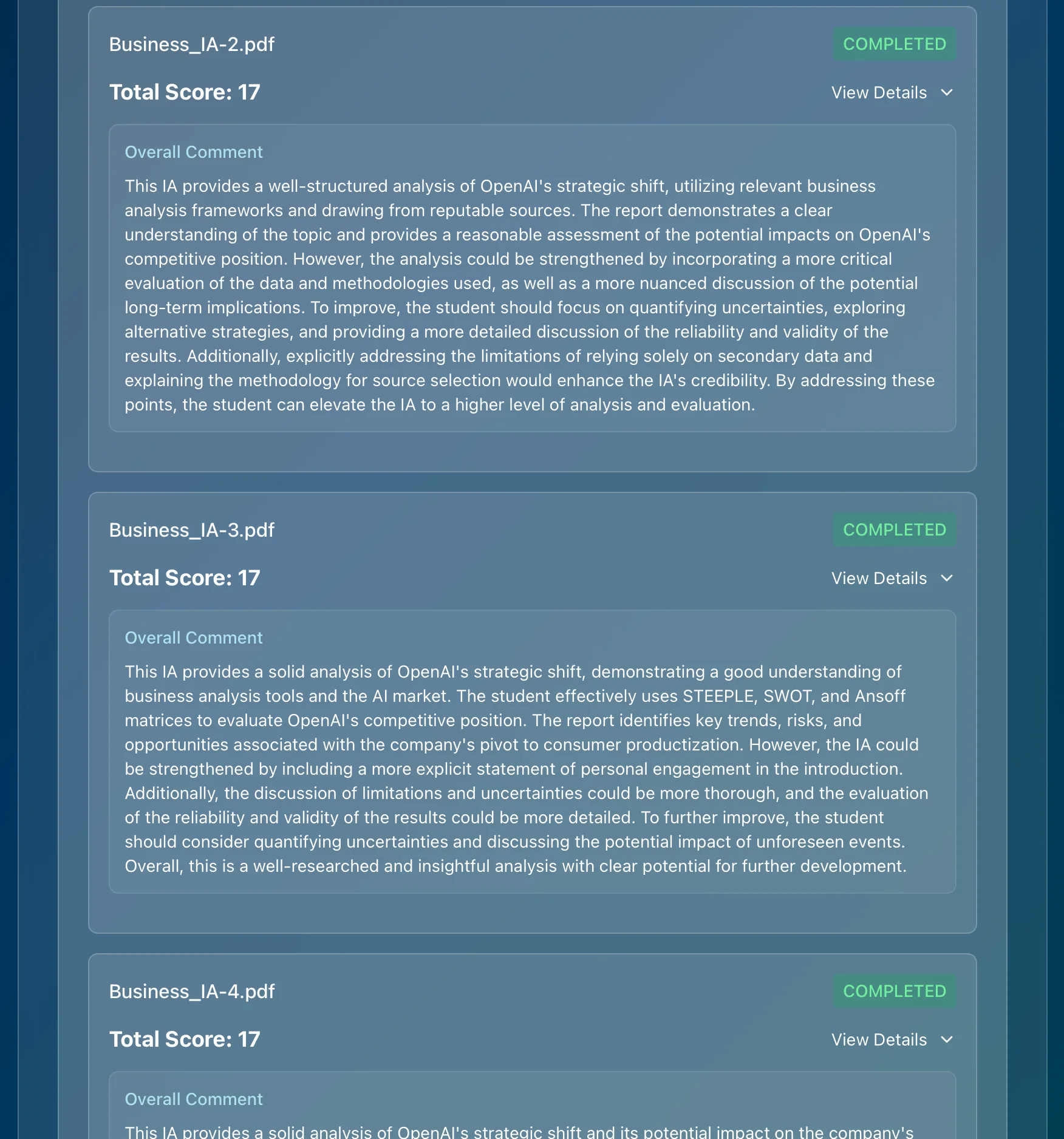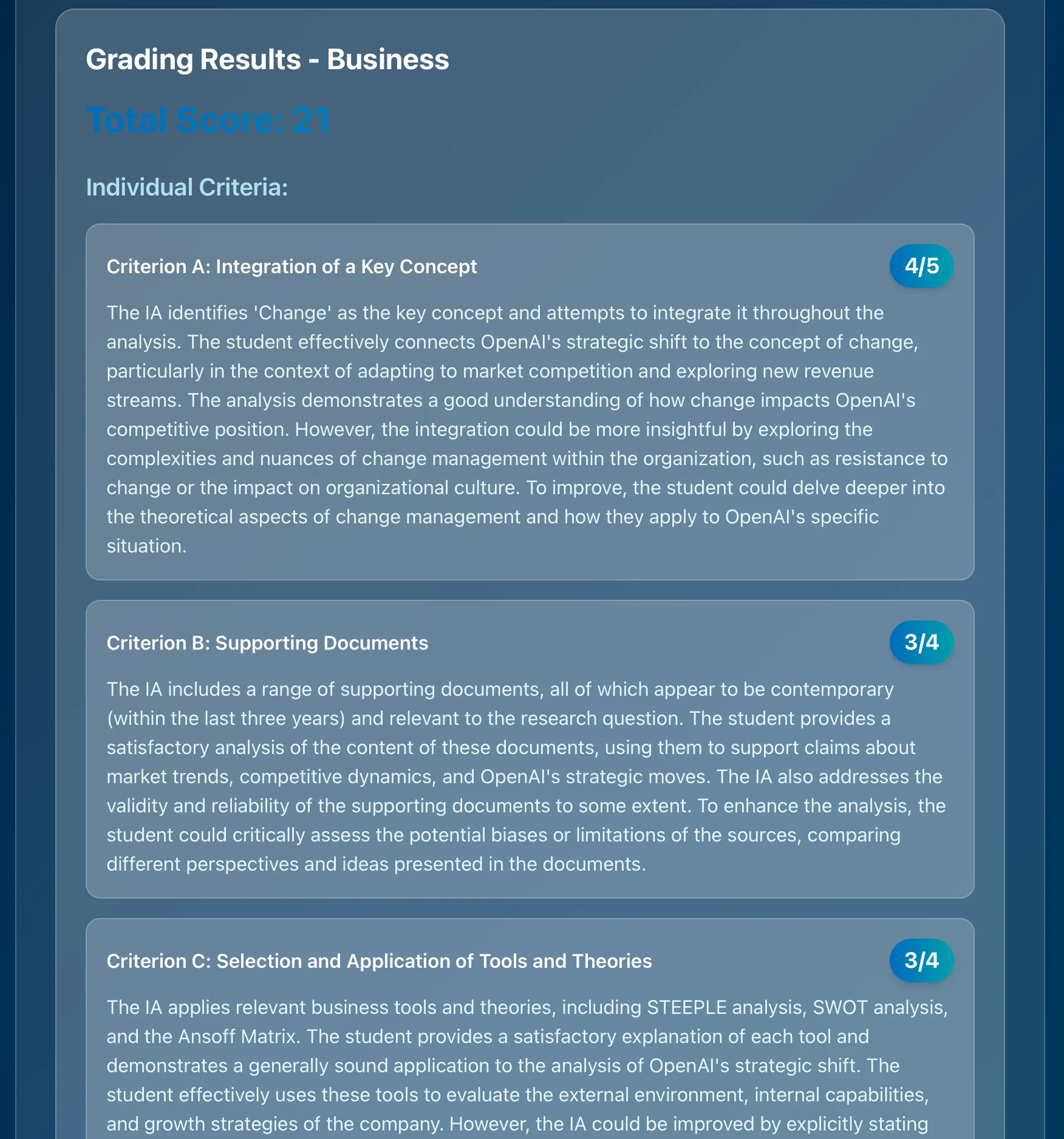IB Grade Boundaries Explained: What You Need to Know
Understanding IB grade boundaries is crucial for success in the International Baccalaureate Diploma Programme (IBDP). These boundaries determine the marks required to achieve each grade in your subjects and assessments. This guide will demystify the IB grading system, explain how grade boundaries are set, and offer practical strategies to maximize your performance. Whether you're an IB student aiming for a top score, a teacher seeking to better understand the assessment process, or a parent supporting your child, this comprehensive explanation will provide the clarity you need to navigate the IB effectively.
What are IB Grade Boundaries?
IB grade boundaries are the minimum marks needed to achieve a specific grade in an IB subject. They are set after the exams have been marked and are designed to ensure fairness and consistency across different examination sessions. Unlike fixed percentage-based grading systems, IB grade boundaries are dynamic and adjusted based on the overall performance of students in a particular exam session. This means that a raw score of, say, 70% might not always translate to the same IB grade.
Think of it like this: the IB wants to ensure that a "level 7" student in May 2024 is performing at the same standard as a "level 7" student in November 2024, even if one exam was slightly harder than the other. The grade boundaries are the mechanism that makes this possible.
Struggling with IB Assessments?
Get instant, detailed feedback on your work with AI that understands IB criteria.

How are IB Grade Boundaries Determined?
The process of setting IB grade boundaries is rigorous and involves several stages:
- Marking: Examiners mark all student papers according to standardized mark schemes.
- Moderation: Internal Assessment (IA) marks are moderated by the IB to ensure consistency across different schools.
- Statistical Analysis: The IB conducts statistical analysis of student performance on each paper. This includes looking at the mean score, standard deviation, and the performance on individual questions.
- Grade Award Meetings: Senior examiners and subject specialists meet to review the statistical data and set the grade boundaries. They consider factors such as the difficulty of the exam, the performance of students on different questions, and historical data.
- Grade Boundary Publication: The final grade boundaries are published on the IB Information System (IBIS) after the results are released.
This process aims to ensure that grades are awarded fairly and consistently, regardless of the difficulty of the exam or the performance of the cohort.
Understanding the IB 7-Point Scale
The IB uses a 7-point scale for each subject, where:
- 7 represents excellent performance
- 6 represents very good performance
- 5 represents good performance
- 4 represents satisfactory performance
- 3 represents mediocre performance
- 2 represents poor performance
- 1 represents very poor performance
To achieve the IB Diploma, you need a minimum of 24 points overall, with satisfactory grades in your subjects. The Extended Essay (EE) and Theory of Knowledge (TOK) can contribute up to 3 bonus points towards your overall diploma score.
Finding the Grade Boundaries for Your Subjects
Unfortunately, the IB does not publicly release grade boundaries for past exam sessions. This is to prevent students from focusing solely on memorizing past papers and instead encourage a deeper understanding of the subject matter.
However, your teachers will have access to the grade boundaries for past sessions through IBIS. They can use this information to give you a general idea of the marks required for each grade. You can also find unofficial estimates and discussions on online forums, but remember that these are not official and should be taken with a grain of salt.
Strategies to Maximize Your IB Performance
While you can't directly control the grade boundaries, you can control your own performance. Here are some strategies to help you maximize your scores:
- Understand the Assessment Criteria: Familiarize yourself with the specific assessment criteria for each subject and assessment component. This is the most crucial step. Know what the examiners are looking for.
- Practice Past Papers: While memorizing past papers isn't the goal, practicing them is essential for understanding the exam format, question types, and time management.
- Seek Feedback: Regularly seek feedback from your teachers on your work. Use their feedback to identify areas for improvement and refine your understanding.
- Manage Your Time Effectively: Time management is crucial during exams. Practice pacing yourself and allocating time to each question based on its mark value.
- Focus on Your Strengths: Identify your strongest subjects and assessment components and focus on maximizing your performance in those areas.
- Address Your Weaknesses: Don't ignore your weaknesses. Seek help from your teachers or peers to improve your understanding of challenging topics.
- Stay Organized: Keep track of deadlines, assignments, and exam dates. Stay organized to reduce stress and ensure you're prepared.
- Take Care of Yourself: Get enough sleep, eat healthy, and exercise regularly. Taking care of your physical and mental health is essential for academic success.
Pro Tip: Get AI-Powered Grading
Stop second-guessing your grades. Get instant feedback aligned with official IB rubrics.

Common Challenges and Mistakes in IB Assessment
Students often face challenges in IB assessments. Here are some common mistakes and how to avoid them:
- Misunderstanding the Assessment Criteria: Failing to fully understand the assessment criteria can lead to irrelevant or incomplete answers. Solution: Carefully review the assessment criteria and ask your teacher for clarification if needed.
- Poor Time Management: Running out of time during exams can result in incomplete answers and lost marks. Solution: Practice time management techniques and allocate time to each question based on its mark value.
- Lack of Depth: Providing superficial answers that lack depth and analysis can limit your score. Solution: Develop your critical thinking skills and provide detailed, well-supported answers.
- Ignoring Feedback: Failing to act on feedback from teachers can prevent you from improving your performance. Solution: Carefully review feedback and use it to identify areas for improvement.
- Procrastination: Leaving assignments and exam preparation to the last minute can lead to stress and poor performance. Solution: Create a study schedule and stick to it. Break down large tasks into smaller, manageable steps.
Advanced Tips and Strategies for IB Success
Beyond the basics, here are some advanced strategies to help you excel in the IB:
- Develop Critical Thinking Skills: The IB emphasizes critical thinking and analysis. Practice evaluating information, forming arguments, and drawing conclusions.
- Master the Art of Essay Writing: Essay writing is a key skill in many IB subjects. Learn how to structure essays effectively, develop strong arguments, and support your claims with evidence.
- Engage in Independent Research: Go beyond the textbook and engage in independent research to deepen your understanding of the subject matter.
- Collaborate with Peers: Collaborate with your peers to discuss concepts, share ideas, and learn from each other.
- Seek Mentorship: Find a mentor who can provide guidance, support, and advice. This could be a teacher, a former IB student, or a professional in your field of interest.
- Reflect on Your Learning: Regularly reflect on your learning to identify areas for improvement and refine your study strategies.
- Understand the Nuances of Each Subject: Each IB subject has its own unique requirements and expectations. Take the time to understand the nuances of each subject and tailor your approach accordingly. For example, the IB Math AA IA requires a different approach than the IB History IA.
Technology and Modern Assessment in the IB
Technology is playing an increasingly important role in IB assessment. From online exam platforms to AI-powered grading tools, technology is transforming the way students are assessed and teachers provide feedback.
One of the most significant developments is the use of AI to assist with grading and feedback. Marksy, for example, is an AI grading assistant specifically designed for the International Baccalaureate (IB). It provides instant, accurate, and detailed feedback on student work based on official IB rubrics. This helps teachers save time and ensure consistency in grading, while also providing students with clear and actionable feedback on how to improve their work.
AI tools like Marksy use official IB criteria to ensure accuracy and fairness. They can analyze student work and provide detailed criterion-by-criterion feedback, highlighting strengths and weaknesses. This allows students to understand exactly how their work aligns with the IB standards and what they need to do to improve.
The time-saving benefits for educators are substantial. By automating the tedious aspects of grading, teachers can focus on providing more personalized support and guidance to their students. This ultimately leads to improved student outcomes and a more engaging learning experience.
Conclusion: Mastering the IB Grading System
Understanding IB grade boundaries is essential for success in the International Baccalaureate Diploma Programme. While you can't directly control the grade boundaries, you can control your own performance by understanding the assessment criteria, practicing past papers, seeking feedback, and managing your time effectively. By avoiding common mistakes and implementing advanced strategies, you can maximize your chances of achieving your academic goals.
Remember, the IB is not just about memorizing facts and figures. It's about developing critical thinking skills, engaging in independent research, and becoming a lifelong learner. Embrace the challenges, seek support when needed, and never stop striving for excellence.
Ready to take your IB performance to the next level? Try Marksy for free today and experience the power of AI-powered grading and feedback! See how Marksy can help you understand your strengths and weaknesses, improve your scores, and streamline your grading workflow.